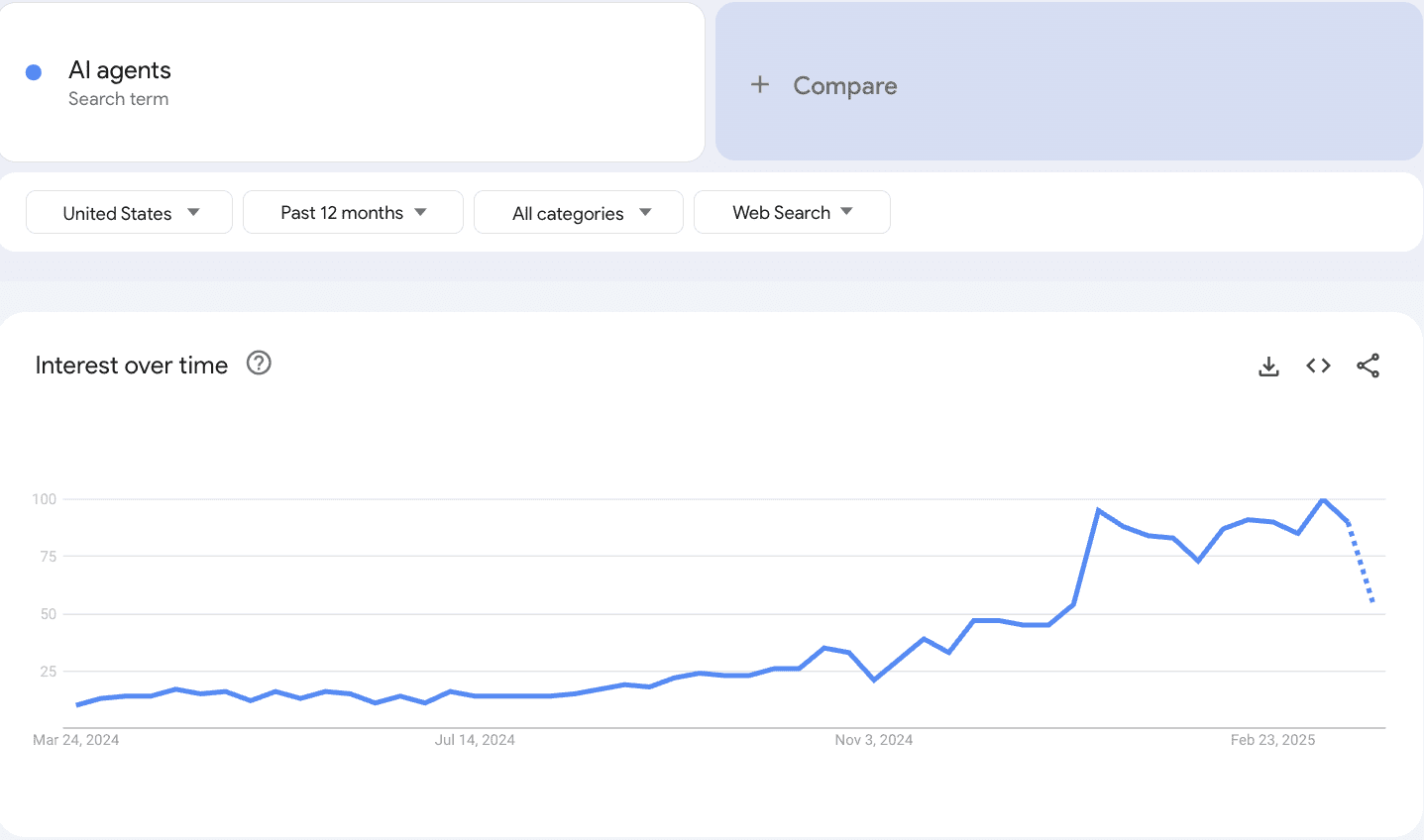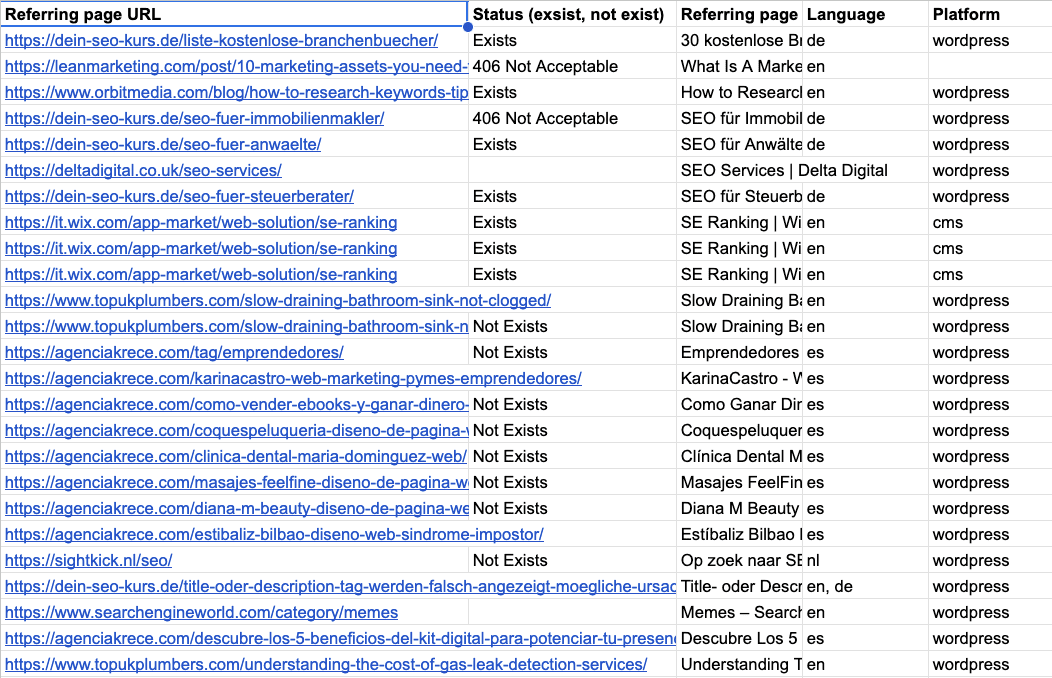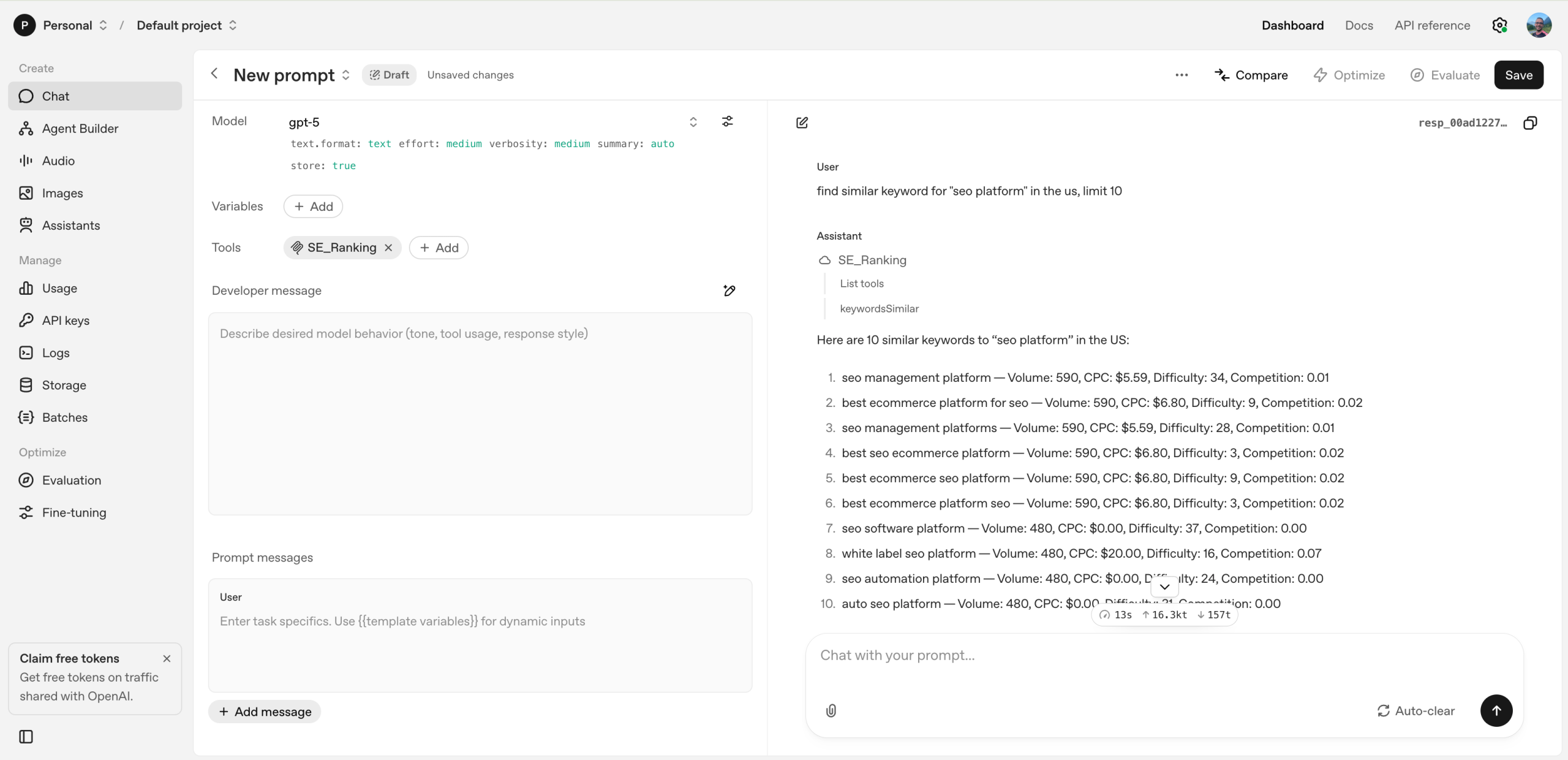We Tested ChatGPT’s Operator Tool for SEO: Here’s What We Found Out
The SEO community is buzzing about ChatGPT’s new Operator mode. This reflects a need for agentic solutions that can automate the manual grind of SEO work.
Here’s our quick appraisal of Operator and what we think it’s currently capable of.
After experimenting with ChatGPT’s Operator, we’ve concluded that it’s not yet a reliable tool for performing complex SEO tasks. We wouldn’t recommend using it for SEO just yet, but it’s still useful for some simple tasks, like pulling meta titles, descriptions, and URLs for individual queries.
Let’s look at how well ChatGPT Operator performed for the SEO tasks we tested it on.
-
ChatGPT Operator is a research preview of an agent that can browse the web and do tasks for you.
-
ChatGPT Operator’s key features include a built-in browser for navigation, parallel task handling, takeover mode for sensitive tasks, multi-step execution, safety controls, customization options, self-correction, and multiple integrations.
-
Having a full SEO analysis requires access to specialized SEO tools.
-
For keyword research and competitor analysis, Operator is ideal for basic insights and not comprehensive reports.
-
Operator can retrieve SERP results (e.g., the top 10) for a selected search query, including its URL, title, and description, but struggles with more detailed data extraction.
-
Operator shows promise for automating tasks like backlink checking and outreach email management.
-
Our tests showed that ChatGPT Operator was slow and inefficient for complex SEO tasks, but costly at $200/month. It was prone to errors and had trouble accessing sites like Reddit. This required constant manual intervention.
-
ChatGPT Operator, as it stands now, is not ideal for advanced SEO, but it has the potential to streamline manual tasks as it continues to evolve.
A Quick Look at ChatGPT Operator
ChatGPT Operator is an early version of its AI agent functionality – a system that can perform tasks on its own and with minimal input. Unlike traditional AI models that require specific instructions for each task, agentic AI can plan, make decisions, and learn from its environment. It can break down large tasks into manageable steps and take action without direct human involvement.
ChatGPT Operator (and OpenAI’s Deep Research) is one of the most powerful and widely used AI agents available today.
Operator, currently in its research preview phase, is a major leap forward for AIs. It runs on GPT-4o, OpenAI’s latest large language model. Boosted by GPT-4o’s vision capabilities and sharper reasoning from reinforcement learning, Operator can “see” web pages via screenshots and navigate them like a human. Give it a command and it will use its built-in browser to search the web, click through pages, scroll, enter text, and more – all based on simple instructions. If it gets stuck, it will either figure out a solution (using its reasoning capabilities) or ask you to take over.
Key features of ChatGPT Operator include:
- A built-in browser to navigate, click, type, and scroll through websites.
- Parallel task handling to manage multiple tasks simultaneously, similar to using multiple browser tabs.
- Takeover mode for handling sensitive inputs like logins and payments.
- Multi-step execution to break down complex tasks into smaller steps and execute them sequentially.
- Safety measures that let you take control of sensitive information like banking transactions.
- Customization options for personalized settings and saved prompts.
- Self-correction and user handoff when needed.
- Multiple integrations with Google Workspace, Slack, OpenTable, StubHub, Uber, and more, to streamline tasks while adhering to platform guidelines.
Here’s how to get started:
- Sign up here.
- Type a prompt into the message bar. For example, let’s say you want to collect the top SERP results for a specific query, including URL, title, and description. With ChatGPT’s Operator, just tell it what you need, and it takes care of everything—navigating the webpage and running the search for you.
- Wait for the Operator to respond.
Here’s how that looks:
How Can AI Agents Transform Your SEO Strategy?
In a lot of ways. And since interest in agentic AI has skyrocketed over the past 12 months, SEOs everywhere are coming up with current and potential use cases.

But agentic AI isn’t just popular in the SEO niche. It’s booming in many other industries. Just look at the impact AI has already had on SEO and search engines in general.
For those focused specifically on how AI shapes search results, our AI Overviews Tracker gives you key insights into the frequency of AI-generated summaries for your keywords. It also tracks source links, ranking changes, AIO link overlap with organic results, and more.
For busy SEO pros juggling tons of tasks, Operator can automate tedious, time-consuming jobs that once ate up hours daily. Now you can automatically analyze target queries, collect top 10 SERP results for individual keywords, receive feedback on your content, and much more.
Marie Haynes recently shared a clever way to use ChatGPT’s Operator for SEO. She fed it GSC data to track how her clients’ keyword rankings shifted after a Google update, focusing on their top keywords. She let Operator do the heavy lifting of checking position changes so she could spend more time spotting trends.
Simple use cases like here point to grander possibilities to streamline SEO workflows.
SEO specialists are currently focusing on using agentic AI for SEO to:
- Enhance autonomy: Let the AI work independently on complex tasks.
- Improve problem-solving: AI finds solutions using reasoning and self-correction.
- Use time efficiently: AI automates repetitive tasks once requiring manual effort.
- Increase accuracy and precision: AI reduces human error in data collection and analysis.
- Scale projects: AI handles multiple queries and websites at once.
Since ChatGPT’s Operator is still in its initial form, there’s plenty of room for improvement. We’ll see how it evolves over the years.
Note that OpenAI has introduced another advanced AI agent—Deep Research. While Operator excels at automating browser-based tasks, Deep Research takes a different approach. It gathers massive amounts of online information and tackles complex, multi-step research tasks with ease.Both agentic features show potential for SEO despite serving distinct purposes.
Let’s compare and contrast OpenAI’s Operator with Deep Research to see which fits your SEO needs better.
Operator
Automates browser-based tasks and interactions
Deep Research
Conducts comprehensive online research and analysis
Operator
- Navigates websites
- Clicks, types, and scrolls
- Fills out forms
- Performs repetitive tasks
Deep Research
- Synthesizes information from many sources
- Creates detailed research reports
- Analyzes text, images, and PDFs
- Adjusts research based on findings
Operator
Computer-using Agent (CUA) with GPT-4o vision capabilities
Deep Research
Version of OpenAI’s o3 model optimized for web browsing and data analysis
Operator
- Does not provide citations or footnotes for its insights
- Self-corrects or hands over control
Deep Research
- Includes citations and footnotes for verified information and sources
- Lower hallucination rate than standard ChatGPT
Operator
Based on task complexity
Deep Research
Takes 5-30 minutes for deep research tasks, delivers comprehensive reports
Operator
- Struggles with complex interfaces
- Limited capabilities for specialized SEO tasks
Deep Research
- May occasionally hallucinate facts
- Can struggle to distinguish authoritative sources
- May not express uncertainty accurately
Operator
Research preview for Pro users in the US
Deep Research
Available to Pro users, coming soon to Plus and Team
Operator
- Automating repetitive web tasks
- Extracting data from specific websites
- Retrieving targeted information
Deep Research
- Complex, multi-step research projects
- Creating comprehensive reports
- Finding niche information across many sources
Automates browser-based tasks and interactions
Conducts comprehensive online research and analysis
- Navigates websites
- Clicks, types, and scrolls
- Fills out forms
- Performs repetitive tasks
- Synthesizes information from many sources
- Creates detailed research reports
- Analyzes text, images, and PDFs
- Adjusts research based on findings
Computer-using Agent (CUA) with GPT-4o vision capabilities
Version of OpenAI’s o3 model optimized for web browsing and data analysis
- Does not provide citations or footnotes for its insights
- Self-corrects or hands over control
- Includes citations and footnotes for verified information and sources
- Lower hallucination rate than standard ChatGPT
Based on task complexity
Takes 5-30 minutes for deep research tasks, delivers comprehensive reports
- Struggles with complex interfaces
- Limited capabilities for specialized SEO tasks
- May occasionally hallucinate facts
- Can struggle to distinguish authoritative sources
- May not express uncertainty accurately
Research preview for Pro users in the US
Available to Pro users, coming soon to Plus and Team
- Automating repetitive web tasks
- Extracting data from specific websites
- Retrieving targeted information
- Complex, multi-step research projects
- Creating comprehensive reports
- Finding niche information across many sources
For more insights, read the comparisons below to explore different AI tools and how they perform in distinct SEO contexts:
How to Use ChatGPT’s Operator for SEO
We tested Operator under four key SEO areas. Quick spoiler: it’s important to approach Operator with realistic expectations. Right now, it’s best suited for simple, repetitive tasks rather than complex SEO analysis.
Let’s look at what worked, what didn’t, and where Operator could fit into your SEO workflow.
Competitor Analysis
A key part of SEO is studying competitors to figure out their game plan, spot gaps in your approach, and discover new opportunities. OpenAI’s Operator has limitations, which can affect the depth and reliability of its analysis.
**Note: We shortened the prompt for clarity.
Prompt: “I want to conduct a comprehensive competitor analysis for my website, https://seranking.com , in the digital marketing/SEO software industry. Please analyze the following competitors based on publicly available information: https://ahrefs.com and https://www.semrush.com.
Provide a detailed breakdown of their SEO performance, content strategy, and backlink profile, focusing on the following key areas:
- SEO Performance Analysis..(we put details here)
- Keyword Strategy & Content Performance..(we put details here)
- Backlink Profile & Link-Building Strategy..(we put details here)
- Social Media & Branding Strategy..(we put details here)
- Competitive Advantage & Weaknesses..(we put details here)
- Report Structure: Provide a well-structured report, summarizing the analysis with visual insights (graphs, tables, comparisons).
- Actionable Insights: Highlight actionable takeaways for improving my SEO strategy based on this analysis.
- Competitive Steps: Suggest specific steps I can take to outperform these competitors.
Context:
My website’s target audience includes small and medium businesses, digital marketing agencies, and SEO agencies. My main goals for this competitor analysis are improving rankings, refining content strategy, and outperforming competitors.
Please, skip tasks that you cannot perform. Log your thoughts into this file: https://docs.google.com/spreadsheets/…”
Results: This complex prompt was a difficult nut to crack for Operator. It began by providing basic insights based on publicly available information and best practices. It struggled to deliver detailed data. This is because most specialized SEO tools require registration or paid subscriptions. So we tried a different approach—we gave it our own credentials.
In theory, you can streamline competitor analysis with Operator by letting it explore rival websites through tools like SE Ranking (with your own credentials). It should be able to pull key competitor data and export it to Google Sheets or Google Docs for easy analysis later.
But the reality is that there are frustrating nuances. When we tried getting Operator to fill a Google Sheet with competitor data, it started strong but abandoned the task partway, leaving us with just a handful of entries.
Here’s where it stopped:

SERP Monitoring
Ask any SEO pro what eats up their time, and SERP monitoring is bound to rank high on that list. Tracking rankings, studying SERP features, and monitoring competitors is crucial—but tedious. We tested ChatGPT’s Operator to see if it could lighten this load for SEOs.
Prompt: “Please perform Bing and Google searches for the following three queries:
- Backlink checker
- Best SEO software
- What is SEO
Collect the top-10 SERP results for each query and add them to this Google Sheet (operator SERP tab):
https://docs.google.com/spreadsheets/d…
Create two columns—one for Google results and one for Bing results. In each column, include the URL, title, and description of the top-10 results. If you come across AI-generated results (like Google AI Overviews) or other featured snippets, please note them as well.”
Results: The outcomes for this prompt were mixed.
On the one hand, Operator struggled with the task. In its first attempt, Operator asked for a Google login to continue working with the sheets. Its second attempt was slightly better, resulting in a more structured table, but still not what we hoped for.
We found that Operator can deliver better results with simpler tasks. For example, it’s great at retrieving SERP data (like the top-10 results) for search queries, including URLs, titles, and descriptions.
Here’s a screenshot of its results:

Keyword Research
Keyword research is important for SEO because it guides you to the right topics and keywords, sharpens your content structure, and reveals what your audience wants. But with steps like digging up terms, checking search volume, gauging difficulty, and assessing intent, it can be a grind. So, we put this to the test with Operator too.
Prompt: “Conduct comprehensive keyword research focused on the target keyword ‘programmatic SEO’ using a US database. Use the SE Ranking platform”
Results: Comprehensive keyword research is beyond Operator’s current scope. Much like in the competitor analysis task, you can give Operator access to Keyword Research tools and assign the AI a task around it. But Operator can only manage one keyword at a time.
It only provides brief summaries like the one below.
For example, its response included: “Using the US database, the keyword “programmatic SEO” has a difficulty of 27/100, a search volume of 40, and a CPC of $0.29. The “SERP Overview” shows top-ranking URLs, but no related keywords or questions are available.”
Link Building and Outreach
Even with all the algorithm changes over the years, link building and quality backlinks remain a big deal. They tell search engines your content’s worth citing, boosting rankings, visibility, and organic traffic. Earning them naturally is ideal, but plenty of SEO strategies still require proactive link-building efforts.
We tested Operator’s capabilities with two prompts: one focused on backlink analysis and the other on outreach activities.
Link building prompt: “In the provided Google Spreadsheet (backlinks operator test):
https://docs.google.com/spreadsheets/d..
Review each URL listed in Column A (“Referring Page URL”).
- Check whether the page contains a backlink to seranking.com.
- In Column B (“Status”), update the status for each URL as:
- “Exists” → If a backlink to seranking.com is found.
- “Not Exists” → If no backlink is found.
Deliverable: The updated spreadsheet with backlink status for each URL. Please note that it’s better to check if the backlink exists in the source code.”
Results: The prompt wasn’t too challenging for Operator. It did pretty well. For example, after we asked it to check if the page links were valid, it gave results almost immediately. But the quality wasn’t so great and the analysis was incomplete. When we double-checked manually, it marked several pages as “Existing” that didn’t.

Link outreach prompt: “Review my Gmail inbox and search for unread messages related to link building. For each relevant email, open the message, read its content, and draft a reply. The response should express interest in link building collaborations, mentioning that my website is actively looking for link building opportunities in SEO and digital marketing topics. We’re specifically interested in websites with a Domain Trust (DT) of 50 or higher.”
Results: This turned out to be one of the stronger use cases. ChatGPT’s Operator nailed automating parts of the link-building and outreach process, especially when communicating with website owners. The tedious work, like finding prospects, creating personalized messages, and managing follow-ups, fits Operator’s skill set nicely.
Here’s an example of an email draft created by Operator:

ChatGPT Operator’s Limitations for SEO Use Cases
Our practical tests with ChatGPT’s Operator for SEO show it’s still evolving, but it’s definitely getting closer to becoming genuinely useful.
OpenAI is upfront that Operator is still in research mode, which explains why it often makes mistakes, abandons tasks midway, or fumbles tricky interfaces. They say it’s “still learning and evolving,” gathering feedback from users like us to get better.
Here are some of the limitations we ran into when putting Operator through its paces:
- Slow and inefficient for complex SEO tasks: For comprehensive tasks like competitor and keyword research, Operator is slow and more trouble than it’s worth. You can’t just set it and forget it. You need to babysit it. While it can perform actions in the browser for you, the results can be hit-or-miss.
- High cost: At $200/month for the OpenAI subscription, it’s a bit pricey, especially for something that can’t handle tasks all that well.
- Incomplete and error-prone outputs: The data it came back with when performing complex SEO tasks wasn’t great. It even stopped, got sidetracked, deleted its inputs, and still required manual revision.
- Access issues with some websites: Reddit, for example, completely blocked it. It was interesting to watch Operator try to problem-solve: first, it tried Bing, then Google, then Duckduckgo, followed by Bing’s cache, and finally the web archive. All attempts were unsuccessful.
We found that ChatGPT’s Operator can tackle some basic SEO tasks and point you in a direction to dig deeper. But you will need to double-check its output. On data security and privacy, OpenAI touts three layers of protection, though it’s not foolproof, and could use some work. Even so, we expect it to get better with time.
If you want to automate your SEO processes while accessing accurate and high-quality data, you can use SE Ranking’s API and its MCP server. This setup delivers SEO insights, such as keywords, competitor analysis, and backlink data, directly within the OpenAI platform through simple prompts. Here’s what it looks like in action:

Our Take on the Future of AI Agents for SEO
The future of SEO is undoubtedly tethered to AI. OpenAI’s SearchGPT, DeepSeek, Perplexity, Google’s AI Overviews, etc., are already driving the trend of using AI in SEO. Using AI agents for SEO is also a new trend and only hints at what’s possible.
While Operator isn’t quite there yet for advanced SEO, it’s only just the early version. Improvements in upcoming iterations could make AI agents way more useful for SEO tasks.
Here’s what to expect from future versions:
- More reliable data collection from complex websites
- Better handling of protected content that requires logins
- Improved accuracy in extracting and organizing SEO data
- Faster processing speeds for research-heavy tasks
- Smoother integration with specialized SEO tools
- More advanced analysis capabilities
As these agents get smarter, they’ll likely need less hand-holding and take on trickier tasks solo.
The real win?
Letting them grind through tedious tasks like data collection and other repetitive work, while we focus on strategy, creativity, and making decisions that actually move the needle.
Summing it up
At the moment, Operator isn’t ready for serious SEO work. But despite the current limitations of ChatGPT Operator for SEO, don’t overlook the potential benefits of AI agents. This could be another major leap for AI, much like the introduction of ChatGPT itself.
Either way, we still need to wait for AI agents to mature. Operator and other ChatGPT models can’t provide accurate, in-depth SEO data on their own yet. It’s still better to rely on powerful SEO tools designed specifically for comprehensive keyword research, competitor analysis, link building, site audits, and much more.
You can get all these capabilities and more with SE Ranking. Give our free trial a shot to see for yourself.

